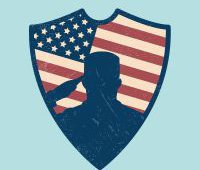Insomnia and concussion: new resource and a free sleep app for veterans via clinical trial (1/20/22 newsletter)
In this newsletter: Opportunities, Education, Sports, Diagnostics, Veterans & Service Members, Statistics, Youth, Culture, and COVID-19.
The lead article, Insomnia and concussion: new resource and a free sleep app for veterans via clinical trial, is in the Veterans & Service Members category.
We appreciate the Concussion Alliance Volunteers who created this edition:
Writers: Will Altaweel, Shelly Seth, Minhong Kim, Conor Gormally & Malayka Gormally
Editors: Conor Gormally and Malayka Gormally
Do you find the Concussion Update helpful? If so, forward this to a friend and suggest they subscribe.
Opportunities
January 21, 11 am PST: free webinar, Caregiver Mental Health, facilitated by Jon Tsen, MS, UW Medicine. Hosted by BIAWA; register in advance.
February 8, 9 am PST: free Traumatic Brain Injury: Addressing Inequities Speaker Series. The three speakers for Feb 8 will cover TBI and IPV; TBI, substance abuse, and housing supports; and TBI “under the Black paradox of life.” The series is hosted by the University of Toronto and supported by a Canada Research Chair in Traumatic Brain Injury in Underserved Populations. Register in advance.
Survey: help influence priorities for future concussion research. The Concussion Priority Setting Partnership is asking people to take a survey to help identify research priorities. The survey takes 10-15 minutes to complete.
Video: The BrainSPORT podcast, produced by the UCLA Steve Tisch BrainSPORT Program, has a new episode on Autonomic Nervous System Dysfunction in Concussion. For further information, see our resource page on Autonomic Nervous System Dysfunction.
Education - 3 topics
We highly recommend this TEDx talk by Dr. Elizabeth Pieroth from TEDxChicago
Dr. Elizabeth Pieroth spoke at TEDxChicago on modern misconceptions about rest and why resuming activity helps recovery from concussion; her talk is 11 minutes. Dr. Pieroth is a “neuropsychologist who has spent her career dedicated to the assessment and treatment of individuals who suffer concussions.”
Flow chart of when telemedicine is appropriate for concussion patients
See our blog post to read this synopsis.
Concussion education program for high school athletes is achieving success
See our blog post to read this synopsis.
Sports
Prospective trial shows eliminating body checking significantly reduces injuries and concussions in adolescent hockey
See our blog post to read this synopsis.
Diagnostics
New study finds biomarkers in urine predictive of concussion
See our blog post to read this synopsis.
Veterans & Service Members - 3 topics
Clinical trial for veterans and active-duty military members with insomnia
Military service members and veterans sometimes struggle with insomnia after coming home. Luckily, cognitive behavioral therapy (CBT) is a common treatment that can help. But in-person sessions aren’t always feasible, especially now with COVID-19 restrictions. The Center for Neuroscience and Regenerative Medicine is testing a CBT-I (Internet Guided CBT) app that was made specifically for military personnel with a history of head injury. This online study is open for enrollment and needs volunteers. Interested? Contact us at cnrm-ecbti@usuhs.edu or call/text 301-456-5474. For more information, see our blog post about this study.
New Concussion Alliance resource, Sleep and Sleep Problems after concussion
To learn why sleep is challenging after a concussion, and why it is crucial for concussion recovery, see our new resource page Sleep and Sleep Problems. The page covers:
the role of sleep in maintaining health
causes of sleep disturbances after concussion
concussion-related sleep disorders (sleep apnea, insomnia, hypersomnia)
how sleep difficulties can influence the number of days to concussion recovery
sleep hygiene tips
when to see a specialist, and how to find a sleep specialist
Persistent post-concussion symptoms, TBI history predictive of intimate partner violence (IPV) perpetration among veterans
See our blog post to read this synopsis.
Statistics
Lower resilience scores associated with higher symptom burden at initial clinic visit and at 3 months out in adolescent and young adult athletes
See our blog post to read this synopsis.
Youth
Study finds signs and symptoms of concussion differ markedly across age groups in youth athletes
See our blog post to read this synopsis.
Culture
Brian-injured intimate partner violence survivor explains why we need TBI screenings for both perpetrators and victims of crimes
See our blog post to read this synopsis.
COVID-19
Vaccination correlated with lower severity for COVID and 50% lower risk for long Covid
A study from The Lancet showed a correlation between vaccination and lower severity of symptoms in individuals who had been vaccinated and later contracted SARS-CoV-2 (COVID-19). This study looked at 1.2 million users in the UK who used self-reported data from the COVID Symptom Study app between December 2020 and July 2021.
The authors found that the likelihood of having symptoms for 28 or more days (classified as “long COVID”) after being infected with COVID-19 was 50% lower in vaccinated individuals (who received two doses) than those who were not vaccinated. They also reported that almost all of the individual symptoms reported were less often experienced in vaccinated patients versus unvaccinated individuals, indicating that the vaccinated will experience a less severe version of the virus as opposed to unvaccinated people.
This paper was published when the Delta variant of COVID-19 was more common and, since then, the Omicron variant of COVID-19 has come to make up more than 95% of cases in the US. The Omicron variant is much more transmissible, which is a point that the researchers highlight while anticipating future variants. Additionally, the authors acknowledge that their sample may not have included people from lower-resource populations, which could affect symptom and recovery times.
Despite these limitations and developments of new variants, the authors emphasize that future, more transmissible variants may lead to the contraction of the virus even after vaccination; getting boosters is the most effective way to reduce infection and severity.
Executive Editor
Concussion Alliance Co-founder, Co-executive Director, and Internship Program Director Conor Gormally




































